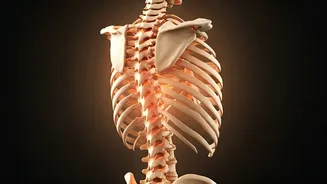Body's Silent Language
The human body is a complex system, and posture serves as a critical channel of communication, subtly revealing our emotions, stress levels, and overall
well-being. Think of it as a non-verbal narrative, constantly being written and rewritten by our physical form. Each stance, every tilt of the head, and even the way we carry ourselves, whispers volumes about our internal landscape. A slumped shoulder may signify feelings of sadness or weariness, while a rigid stance may indicate tension or anxiety. Being aware of these signals can be a powerful tool, providing insights into our mental and emotional states and allowing us to manage stress more effectively. Understanding these physical cues is the first step toward promoting better mental and physical health. It facilitates self-awareness and helps in adopting mindful practices for emotional and psychological balance.
Dangerous Postures Uncovered
Certain postures can be more indicative of stress and can potentially lead to physical discomfort or health issues. One such posture is the 'slouched shoulders.' This position, where the shoulders round forward, may signal feelings of exhaustion, low self-esteem, or even underlying depression. Another posture to watch out for is 'forward head posture,' often seen in those who spend extended periods looking at screens. This can strain the neck muscles, causing headaches and neck pain. The 'crossed legs' pose, though seemingly harmless, may indicate a sense of defensiveness or discomfort. Moreover, the 'freefall' or stomach sleep posture is also associated with potential adverse effects, including neck pain and strain on the lower back. Becoming aware of the implications of such postures is crucial to promoting both physical health and psychological wellness.
Stress' Physical Manifestations
Stress, whether physical or emotional, often manifests through posture. The body tends to react to stress by tensing muscles. This tension can lead to a variety of postural changes. For instance, people experiencing significant stress often exhibit a hunched stance, as the neck and back muscles tighten, making them feel small and closed off. Prolonged stress can also lead to the tightening of the jaw muscles, leading to teeth clenching. Furthermore, people might experience a rapid heart rate, which could translate into a tense and upright posture. A consistent awareness of these changes can enable individuals to identify stressors early. This awareness offers the opportunity to practice stress-reduction techniques and improve both mental and physical health.
Posture & Overall Well-being
Our posture has a direct correlation with our overall well-being, influencing everything from physical health to our mood. Adopting a good posture helps support internal organs and allows us to breathe deeply, leading to increased oxygen flow and reduced stress. It can promote a sense of confidence and positivity, influencing interactions with others. Conversely, poor posture can worsen mood, energy levels, and self-esteem. It can also lead to a variety of physical ailments, including back pain, neck pain, and headaches. Consciously correcting posture can be a positive step toward better health. Regular exercise, especially activities like yoga or Pilates, can strengthen core muscles and improve posture. These practices are also useful for mindfulness, which leads to enhanced mental health and greater self-awareness.
Finding Inner Balance
Taking control of our posture is an important aspect of managing stress and improving our overall well-being. Regular self-assessment and the implementation of postural correction exercises are two key strategies. Regular breaks during long periods of sitting or standing are essential to allow the muscles to relax. Practicing mindfulness and meditation can provide tools for identifying and managing stress, positively impacting posture. By consciously noticing and correcting our posture, we can promote physical health and also cultivate a sense of self-awareness. Ultimately, creating a harmonious balance between our physical and mental states promotes a holistic approach to a healthier, more balanced life.















![[WATCH] 'Real Madrid, Ramadan and rest' - Mohammed Siraj how last-minute World Cup call-up changed February plan](https://g-mob.glance-cdn.com/public/fc/image/ByYT_LEmlrD0.webp)
